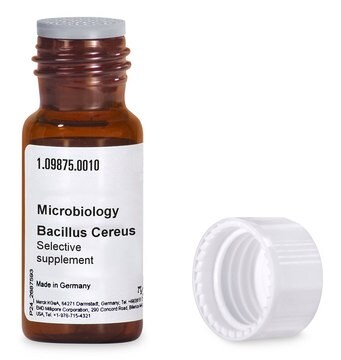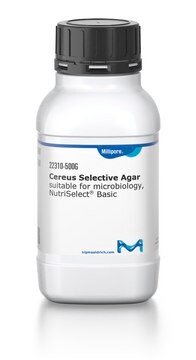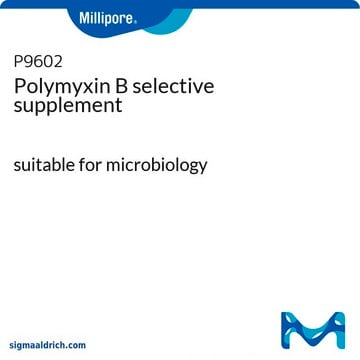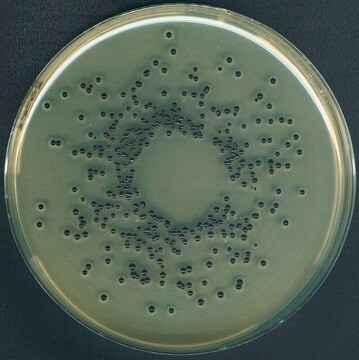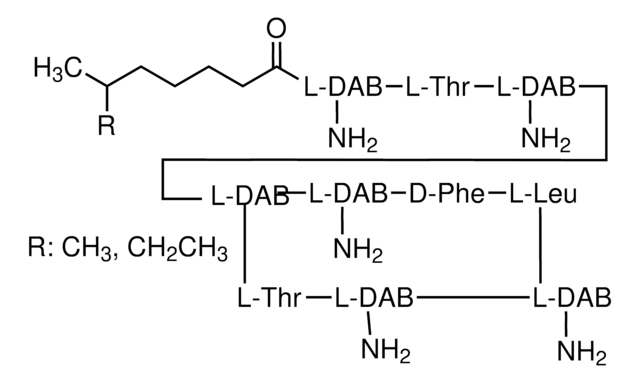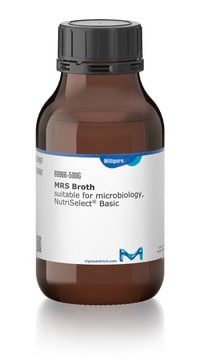1.05267
GranuCult® Mannitol egg yolk polymyxin agar (base)
acc. ISO 7932, ISO 21871, FDA-BAM, and APHA, suitable for microbiology
Synonym(s):
MYP agar, Bacillus Cereus Selective Agar, Cereus Selective Agar Base, MYEP agar
About This Item
Recommended Products
Agency
APHA
ISO 21871
ISO 7932
Quality Level
reg. compliance
FDA (BAM)
sterility
non-sterile
form
granular
manufacturer/tradename
GranuCult® prime
technique(s)
microbiological culture: suitable
pH
7.0-7.4 (25 °C, 43 g/L in H2O, after autoclaving)
solubility
43 g/L
application(s)
food and beverages
microbiology
storage temp.
15-25°C
suitability
Bacillus cereus
General description
Application
Analysis Note
Appearance (color): red
pH-value (25 °C): 7.0 - 7.4
Growth promotion test in accordance with the current version of DIN EN ISO 11133.
Inoculum on reference medium (Bacillus cereus ATCC 11778 (WDCM 00001)):
Colony count (Bacillus cereus ATCC 11778 (WDCM 00001)):
Recovery on test medium (Bacillus cereus ATCC 11778 (WDCM 00001)): ≥ 50 %
Growth (Bacillus subtilis ATCC 6633 (WDCM 00003)): no limit
Growth (Escherichia coli ATCC 8739 (WDCM 00012)): total inhibition
Growth (Escherichia coli ATCC 25922 (WDCM 00013)): total inhibition
Colonies (Bacillus cereus ATCC 11778 (WDCM 00001)): pink colonies with precipitation halo
Colonies (Bacillus subtilis ATCC 6633 (WDCM 00003)): yellow colonies without precipitation halo
Incubation:
B.cereus 24 ± 3 to 44 ± 4 hours at 30 ± 1 °C
other teststrains 44 ± 4 hours at 30 ± 1 °C
A recovery rate of 50 % is equivalent to a productivity value of 0.5.
The indicated colony counts result from the sum of a triple determination.
Reference media: Tryptic Soy Agar
Footnote
The designations basic, plus, or prime are added to indicate the quality control level, from basic quality control to standard QC plus to prime for full regulatory compliance.
Legal Information
Storage Class Code
11 - Combustible Solids
WGK
WGK 3
Certificates of Analysis (COA)
Search for Certificates of Analysis (COA) by entering the products Lot/Batch Number. Lot and Batch Numbers can be found on a product’s label following the words ‘Lot’ or ‘Batch’.
Already Own This Product?
Find documentation for the products that you have recently purchased in the Document Library.
Customers Also Viewed
Our team of scientists has experience in all areas of research including Life Science, Material Science, Chemical Synthesis, Chromatography, Analytical and many others.
Contact Technical Service